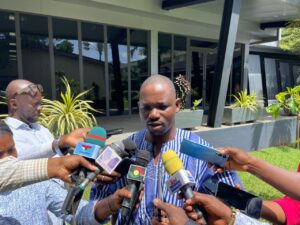By Kizito CUDJOE
An alliance of civil society organisations (CSOs) has urged government to require car manufacturers operating in the country, as well as potential investors, to incorporate electric vehicles (EVs) production into their operations.
This, the alliance argues, aligns with the country’s goal of achieving net-zero emissions – set for 2070 as part of the global push for energy transition.
Africa Senior Programme Officer at the Natural Resource Governance Institute (NRGI), Denis Gyeyir, highlighted the growing demand for EVs in the country, noting that over 2,000 are currently in use according to recent data.
Given this, Mr. Gyeyir said it is imperative to ensure that assembly plants established by traditional automakers include EV production capabilities. He said this will support the country’s EV policy and help align with global trends.

He also stressed the educational benefits, pointing out that students studying renewable energy at local universities need hands-on opportunities to apply their knowledge.
“Providing practical training for these students is essential for their integration into the industry, allowing them to actively participate in the transition to clean energy,” Mr. Gyeyir said.
He added: “It is not enough for government to highlight the number of car manufacturers entering the country. We must link this to a clear direction of where the world is heading – and EVs are the future”.
The domestic automotive sector is projected to reach a value of US$11billion by 2028 at a compound annual growth rate (CAGR) of 11 percent.
The bullish projection by Ghana Jobs and Economic Transformation (JET) follows some of the industry’s global leading names’ entry into the country.
The projection, according to JET, is attributed to enticing opportunities for carmakers to integrate into regional and global supply chains – especially with implementation of the Africa Continental Free Trade Area (AfCFTA).
Mr. Gyeyir, who speaking on the side-lines of the ‘CSOs Post-Manifesto Dialogue’ in Accra, also pointed out the importance of developing lithium battery manufacturing; which he described as “crucial for the future”.
He called for building industries locally to add value for the country’s natural resources: such as lithium, graphite, cobalt, nickel and iron.
The dialogue, organised by an alliance of CSOs consisting of four coalitions and eight organisations, centred on key thematic areas including energy transition, the upstream/downstream petroleum and gas sector, forests, environment & climate change and anti-corruption.
It follows a June 2024 meeting with political parties ahead of their manifesto development, where CSOs shared policy proposals on these themes.
Given that political parties have launched their manifestos, this follow-up dialogue provided an opportunity for parties to present their plans on addressing these issues and allowed for clarifications and further discussions between CSOs and other stakeholders.










